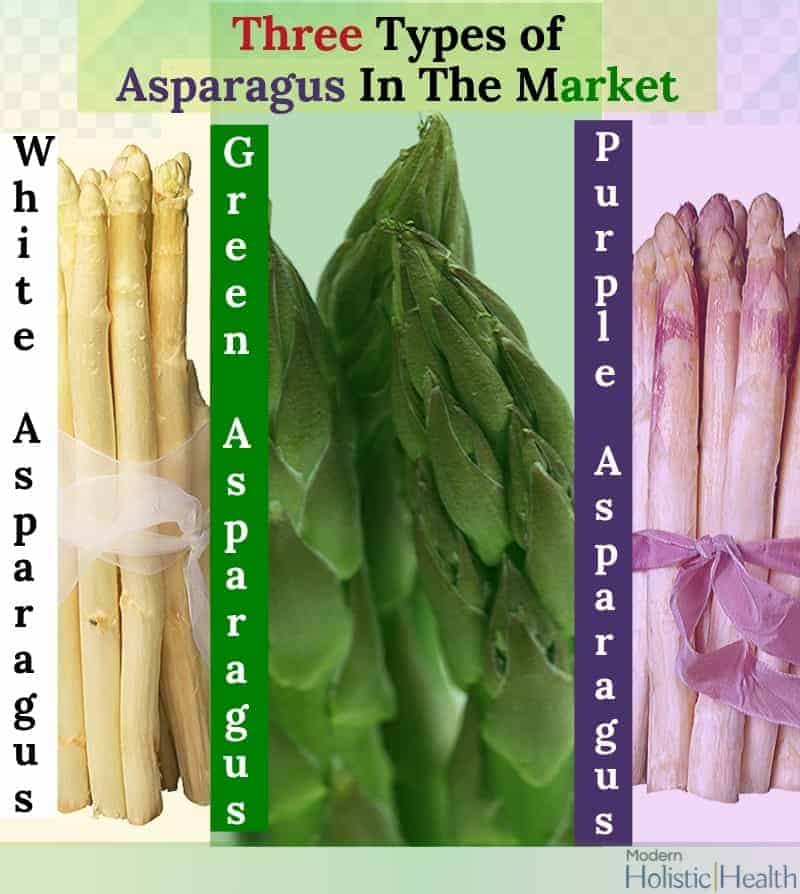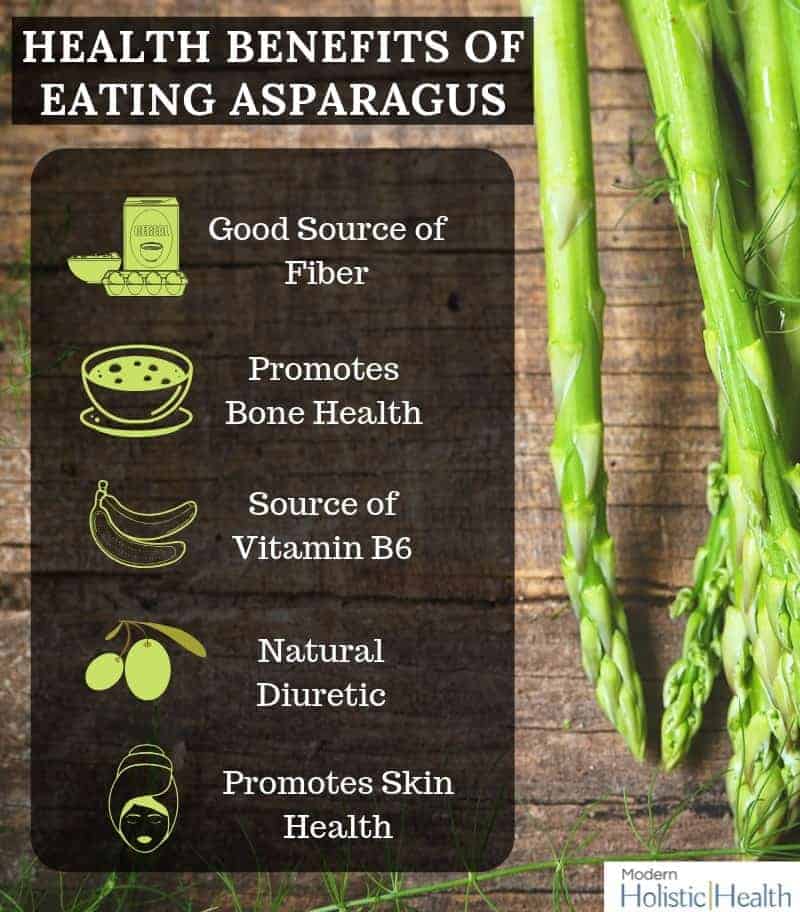
Low in calories and packed with nutrients, asparagus brings an array of scientifically proven health benefits to humankind. Asparagus is a nutrient-dense vegetable that is loaded with minerals, vitamins, and antioxidants like fiber, potassium, vitamin B6, A and C, thiamine and folic acid.
Its antioxidant and anti-inflammatory properties have long been used in human history for a variety of medicinal purposes. Even the American Institute for Cancer Research has deemed it a valuable part of a diet that reduces the risk of cancer.
There are three main types of asparagus you’ll find in the market. They are;
1. Green Asparagus: American and British
2. White Asparagus: Dutch and Spanish
3. Purple Asparagus: French

The green asparagus is the most commonly consumed form of asparagus, whereas the white is difficult to harvest, and purple is smaller and fruitier in nature. Asparagus is readily available in the market nearly year round and should be consumed immediately after purchase.
8 Health benefits of eating asparagus
As we discussed before, asparagus is loaded with vitamins and minerals which allow it to effectively ally with the body when it comes to overcoming ailments like cancer, heart disorders, high blood pressure, etc.
Let’s go in-depth to understand how exactly asparagus benefits our body.
1) Good Source of Fiber
Asparagus is the perfect low carb vegetable that provides enough fiber to the body. It is digested slowly and keeps the stomach feeling full. A serving of asparagus contains more than a gram of soluble fiber. Soluble fiber dissolves in our body in a gluey mess that traps sugar, fat, bacteria, and other such toxins and flushes them out of our body. The dietary fiber found in asparagus can lower the risk of type 2 diabetes and also reduce the risk of heart failure.
Because the soluble fiber in asparagus allows it to be digested slowly and keeps the stomach feeling full, it is a perfect vegetable for weight loss. As studies have shown, individuals with high dietary fiber have fewer chances of developing obesity due to overeating. Hence, asparagus is a good option for those looking to shed those extra pounds.
2) Can Help Tackle Cancer
One of the most significant benefits of asparagus, especially for men, is its extracts have been found to defend against prostate cancer. Studies suggest that extract of asparagus laricinus shows selective cytotoxicity to cancer cells, but not to non-cancerous cells.
Asparagus also contains glutathione, a detoxifying compound that can help eliminate carcinogens from the body. Glutathione is vital for the body’s immune system and can help protect the body from certain forms of cancer, like bone, lung, breast, and colon cancers.
3) Promotes Skin Health
The presence of vitamin A and various other antioxidants in asparagus make it one the most potent natural dietary option that helps improve skin health. It can help protect the skin from the sun and also reduce the risk of skin cancer. The vitamin A in asparagus may also help balance the oil levels on the skin, thus preventing acne.
4) Nourishes the Digestive Tract
Our body needs healthy bacteria to protect the gut and allow for convenient nutrient absorption in the body. Asparagus comes with a significant amount of the nutrient inulin, which passes off undigested food to the large intestines where it becomes a vital food for good and healthy bacteria. A substantial level of healthy bacteria in the body helps nourish our digestive tract and also helps lower the risk of pancreatic and colon cancer.
5) Promotes Bone Health
Asparagus is a good source of Vitamin K for the body, and it has been found to have a significant role in improving the bone health of the body. Vitamin K works with vitamin D to facilitate cell growth, bone mineralization, and tissue renewal.
Vitamin K can not only increase bone mineral density in osteoporotic people but also effectively reduce fracture rates in them.
6) Contains Antioxidant and Anti-inflammatory
Asparagus is especially popular for its antioxidant and anti-inflammatory properties. Two types of antioxidants are found in this vegetable, phenols, and flavonoids. Both are vital in the prevention of diseases, both chronic and benign, in the body.
We have also discussed the antioxidant glutathione being a key component of asparagus. Studies have shown that glutathione slows down the aging process and helps protect the skin from sun and pollution. In a nutshell, asparagus’s antioxidant and anti-inflammatory properties are vital in overcoming issues of heart disorders, cancer, type 2 diabetes, and more.

7) Is a Natural Diuretic
Asparagus acts as a natural diuretic, which essentially means that it helps in the production of urine, and stops the body from bloating. The excretion of water from the body in the form of urine helps flush out excess fluid and salt from the body. This helps in the regulation of blood pressure.
Asparagus is, therefore, extremely beneficial for people with edema, which is the accumulation of fluids in the body’s tissues. It is also beneficial in helping lower blood pressure and reducing the risk of heart-related conditions.
In conclusion, asparagus is good for the kidneys and can also act as a potent remedy against urinary tract infections.
8) Source of Vitamin B6 and Thiamine
Thiamine helps the body convert high amounts of carbs into energy, thus helping enhance metabolism, focus, and strength. Both B vitamins and Thiamine are vital in helping the body harness energy from the food it consumes.
B Vitamins support the metabolism of sugar and starch; hence, they are vital in blood sugar management. These vitamins also help in regulating homocysteine. Homocysteine is an amino acid, which in excess can lead to heart disorders. Hence, it is also essential to promote good heart health.
Asparagus in Diet
Asparagus with stronger spears and tight heads are what you need to look for when out shopping for it. You can quickly test its freshness by checking whether it snaps when bent.
Asparagus can be cooked and served in multiple ways. You can sauté it in a pan with lemon, water, and olive oil. It can also be grilled or roasted in the oven. The best way to have asparagus is by steaming it, as this is fast and helps preserve all of its nutrients.
If you don’t mind the taste, asparagus can also be had as a juice. The juice is an excellent source of folate, beta carotene, and vitamin K. It also helps with bloating as it increases the production of urine.

-
Modern Holistic Health
3267 Bee Cave Rd, Ste. 107-187 Austin, TX 78746 - 512.550.7933 | (888) 260-3377
- [email protected]







